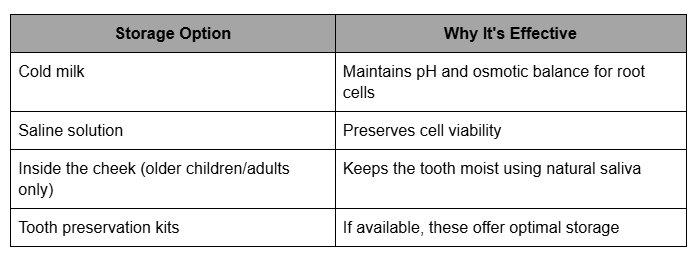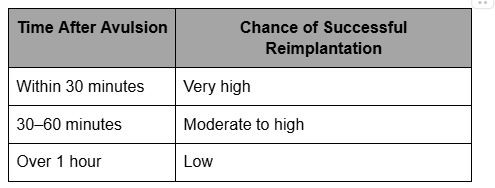Tooth Loss Emergency? Here's How to React in Seconds

A fall during a match, a sudden accident at home, or an unexpected collision, these are the moments that can change everything in a split second. One of the most shocking dental injuries is avulsion: when a tooth is completely knocked out of its socket.
In these critical moments, panic often takes over. But knowing exactly what to do, and doing it quickly, can be the difference between saving and losing a tooth. This blog will guide you through what constitutes a tooth loss emergency, the steps to take immediately, and how professional care plays a crucial role in recovery.
What Is a Tooth Loss Emergency?
Tooth avulsion is a serious dental emergency that occurs when a tooth is fully dislodged from its socket. Unlike chipping or loosening, this situation requires urgent action. While anyone can experience it, children, athletes, and those in active environments are especially at risk.
Common Causes of Avulsion:
-
Sports injuries (e.g. football, rugby, hockey)
-
Falls or direct facial trauma
-
Bicycle or road accidents
-
Assaults or physical altercations
What makes this different from other dental injuries is the narrow window for treatment. Acting within the first hour drastically improves the odds of saving the tooth.
The Critical First 60 Seconds
The immediate moments after the injury are crucial. Staying calm and acting efficiently is key to improving the chances of reimplantation.
Tooth Rescue Checklist – First 60 Seconds:
-
Locate the tooth quickly
-
Pick it up by the crown (top part), not the root
-
If dirty, rinse briefly with cold water no scrubbing or soap
-
Try to place the tooth back in its socket (if the person is conscious and cooperative)
-
If reinsertion isn’t possible, store the tooth in an appropriate medium
-
Seek professional help immediately
Handling the tooth with care is vital, especially avoiding damage to the delicate root tissue.
How to Store a Knocked-Out Tooth
If reinserting the tooth immediately isn’t feasible, the next best thing is to store it in a safe and moisture-rich environment. This helps preserve the living cells on the root surface until you can get to a dental clinic.

Avoid storing in:
-
Tap water (it damages root cells)
-
Tissue or napkins (tooth may dry out)
-
Cleaning agents or mouthwash
Moisture matters. Without it, the tooth’s chances of survival drop significantly.
What Not to Do in a Dental Emergency
Even with the best intentions, certain actions can worsen the situation. Here are common missteps that can compromise tooth reimplantation:
Avoid the Following:
-
Touching or cleaning the root of the tooth
-
Using soap, disinfectants, or scrubbing the tooth
-
Letting the tooth dry out
-
Delaying professional dental care
-
Storing the tooth in unsuitable liquids like tap water
These mistakes can kill root cells, making reattachment much harder for your dental team.
When to Call a Dentist
Once the initial first aid is done, you should immediately contact a dentist in Wokingham or the nearest emergency dental service. The sooner you receive professional intervention, the better the prognosis.

Expect the Dentist to:
-
Examine the avulsed area and the tooth
-
Reinsert the tooth if it hasn’t already been done
-
Use a splint to stabilise the tooth to adjacent ones
-
Prescribe antibiotics if infection risk is high
-
Recommend a tetanus booster if the injury came from a dirty source
-
Schedule follow-up appointments to monitor healing
Visiting an emergency dentist in Wokingham within 30 to 60 minutes is optimal for reimplantation success.
Long-Term Care After Reimplantation
Even after the tooth is successfully placed back in its socket, the journey doesn’t end there. Continued care and monitoring are essential to ensure that the tooth reintegrates properly with surrounding tissues.
Follow-Up May Include:
-
Periodic X-rays to check healing
-
Root canal treatment (in most adult cases)
-
Avoidance of biting with the affected tooth for several weeks
-
Soft diet during healing
-
Good oral hygiene practices
The dentist may also provide a mouthguard if the avulsion resulted from sports activity.
Preventing Tooth Loss Emergencies
While some accidents are unavoidable, certain precautions can significantly reduce the risk of experiencing a dental trauma like avulsion.
Prevention Tips:
-
Wear a custom-fitted mouthguard during contact sports
-
Supervise children during active play
-
Secure furniture edges in homes with small children
-
Encourage routine check-ups with your dentist in Wokingham
-
Educate family members on basic dental first aid
Being prepared is just as important as knowing how to respond.
Essential Items for a Dental Emergency Kit
Being prepared for dental emergencies starts with having the right tools on hand. A small, dedicated dental first aid kit can make a crucial difference when time is of the essence.
Include in your kit:
-
A clean container with a secure lid (for tooth storage)
-
Sterile saline solution or a sealed bottle of cold milk
-
Medical gloves
-
Gauze pads
-
A small mirror and torch
-
Contact details for your dentist in Wokingham and local emergency dentist in Wokingham
This simple preparation empowers you to act quickly, confidently, and effectively during a dental crisis.
Why Timing Matters
Time is the most critical factor in avulsion cases. Ideally, a knocked-out tooth should be reinserted or stored properly and treated within 30 to 60 minutes. After an hour, the likelihood of successful reattachment drops considerably.
Time vs. Success Rate:

Quick decision-making and immediate access to an emergency dentist in Wokingham can truly make all the difference.

Video Link : https://rumble.com/v6qkjj6-emergency-dentist-wokingham-fast-reliable-care-when-you-need-it.html
Conclusion
Tooth loss emergencies are stressful, but they don’t have to result in permanent damage. Understanding the right steps, from handling the tooth to seeking professional care, can dramatically improve outcomes. Whether caused by a sports mishap, a fall, or an unexpected blow, tooth avulsion requires fast, informed action.
If you're in need of follow-up care or preventative tools like mouthguards, Wokingham has experienced dental professionals ready to help. By staying prepared and responding quickly, you can give yourself, or someone else, the best possible chance to save a smile.
- Art
- Causes
- Crafts
- Dance
- Drinks
- Film
- Fitness
- Food
- Игры
- Gardening
- Health
- Главная
- Literature
- Music
- Networking
- Другое
- Party
- Religion
- Shopping
- Sports
- Theater
- Wellness



